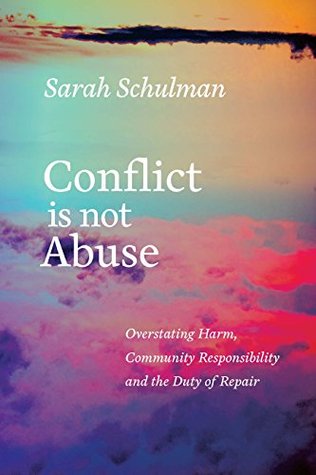More on this book
Community
Kindle Notes & Highlights
Read between
May 20 - June 11, 2018
Part of peace-making is acknowledging that we can’t know everything about ourselves, and sometimes we reveal things to others that we are not ready to accept.
Refusing to speak to someone without terms for repair is a strange, childish act of destruction in which nothing can be won. Like all withholding, it comes from a state of rage, and states of rage are products of the past.
Without conversation, it is the person with the most limitations who is in control.
It keeps them imprisoned in their own imagined negative fears about the other, and their fantasies of their own potential humiliation or demise if they were to talk to the other person and thereby understand what the other person is thinking and feeling. Often these blocks are instigated over Nothing, Normative Conflict, or Simple Difference. It gets elevated in importance in the blocker’s mind because they are too anxious to negotiate, or are paralyzed by negative fantasy about actually speaking to the dehumanized other.
“Believe women!” We have this slogan in circulation because so many women are not believed when they tell the truth. But what about when they are not telling the truth? Are we still supposed to believe them? The histories of racism and colonialism remind us regularly that white women lying have been used to justify all kinds of cruelty against people of color, especially Black and Brown men in the United States. When we insist that we must “believe women” no matter what, we do help people who are telling the truth about violations they have experienced. But there are all kinds of truth.
In a world based on blame, women have to be clear to be clean, unfortunately, so avoiding blame means avoiding complexity, contradictions, and ambivalences.
People may feel angry, frustrated, upset. But this does not mean they are being abused. They could, instead, be in Conflict. Instead of identifying as a victim, they might be, as Matt Brim suggested, Conflicted. Therefore the fact that one person is suffering does not inherently mean that the other party is to blame. The expectation that we will never feel badly or anxious or confused is an unreasonable expectation and doesn’t automatically mean that someone else is abusing us. These emotions are part of the human experience.
People may not know how to make things better, how to look at their own participation, how to deal with feeling badly about themselves. They may not know how to understand their own actions, and are afraid of the implications of their actions on the meaning of their lives. And this may be devastating, tormenting, and painful. But this is not being Abused. It doesn’t get resolved by organizing punishment of another person. And someone who feels conflicted in this way does not have the right to take punitive actions against another person because they feel bad.
Being in a negative moment with another person can be destabilizing, hurtful, and stressful, especially if a person’s self-concept requires them to think of themselves as perfect. But it is not, by definition, Abuse. It could be Abuse, if one has power over another, but if not, it’s a Conflict. And being in a Conflict is a position that is filled with responsibility and opportunity.
Or they can identify “Power Struggle” situations of Conflict and not only avoid the unjustified punishment and stigma of those falsely accused of Abuse, but they can also help people who simply can’t problem-solve because they lock themselves into a victimized self-perception.
Lacking the support and encouragement to successfully negotiate does not mean that someone is being victimized.
True, we have to recognize that the frustration of not knowing how to solve problems and only knowing how to escalate can feel like a response to an ou...
This highlight has been truncated due to consecutive passage length restrictions.
People who describe themselves as “Abused” when they are actually in Conflict are not lying; they usually don’t know the difference.
Does the person feel unsafe when they are not actually unsafe, but rather because the other party, with whom they are in Conflict, is bringing up issues about their life that are troublesome and therefore initially feel overwhelming and difficult to face. Accusations of Abuse, when it is in fact Conflict, can be a smokescreen, obscuring the real problems at hand and making effective response difficult.
Or were you so traumatized from being demeaned constantly as a child that as an adult you can’t tolerate difference, and any normative challenge is perceived of as an assault or threat?
There is often a “cadre” of bad friends around a person encouraging them to do things that are morally wrong, unjustified, and unethical, because endorsing each other’s negative actions is built into the group relationship. Kendell recognized how crucial the surrounding community is in determining if a person will insist on false claims of harm or, the opposite, face their own participation.


